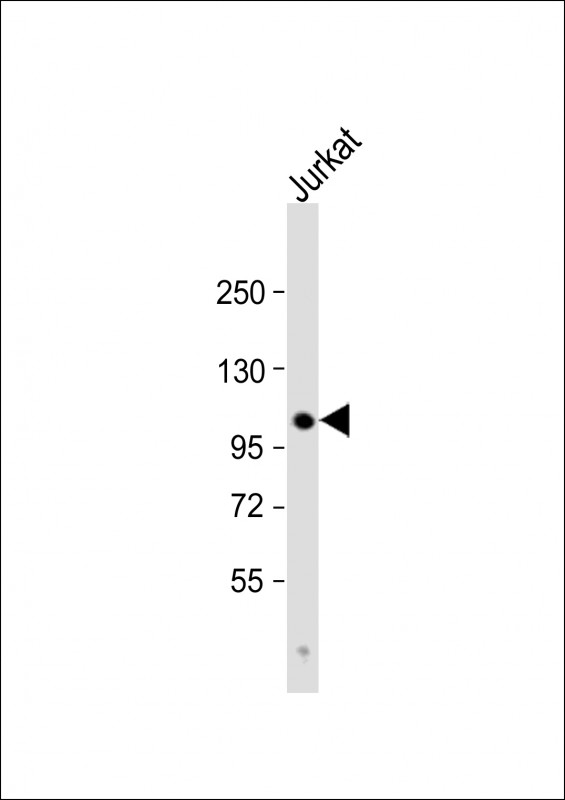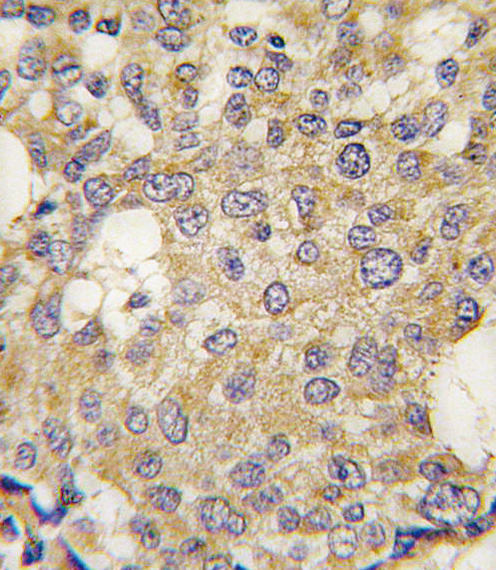

| WB | 1/1000 | Human,Mouse,Rat |
| IF | 咨询技术 | Human,Mouse,Rat |
| IHC | 1/100-1/500 | Human,Mouse,Rat |
| ICC | 技术咨询 | Human,Mouse,Rat |
| FCM | 咨询技术 | Human,Mouse,Rat |
| Elisa | 咨询技术 | Human,Mouse,Rat |
| Aliases | Poly(ADP-ribose) glycohydrolase, PARG |
| Entrez GeneID | 670;8505 |
| WB Predicted band size | 111.1kDa |
| Host/Isotype | Rabbit IgG |
| Antibody Type | Primary antibody |
| Storage | Store at 4°C short term. Aliquot and store at -20°C long term. Avoid freeze/thaw cycles. |
| Species Reactivity | Human |
| Immunogen | This Parg antibody is generated from rabbits immunized with a KLH conjugated synthetic peptide between 390-421 amino acids from the C-terminal region of human Parg. |
| Formulation | Purified antibody in PBS with 0.05% sodium azide,1%BSA and 50% glycerol.prepared by Saturated Ammonium Sulfate (SAS) . |
+ +
以下是3篇涉及PARG(聚ADP-核糖糖水解酶)抗体的代表性文献摘要信息,供参考:
---
### 1. **"Poly(ADP-ribose) glycohydrolase (PARG) regulates DNA repair and tumor progression"**
**作者**: Sharifa N. Riffell et al.
**摘要**:
该研究利用特异性PARG抗体,通过免疫沉淀和免疫荧光技术,揭示了PARG在DNA损伤修复中的动态定位。研究发现,抑制PARG活性会增强PARP抑制剂(如奥拉帕尼)的抗肿瘤效果,提示PARG可能成为癌症治疗的潜在靶点。
---
### 2. **"PARG inhibition sensitizes cells to PARP inhibitors and delays DNA repair"**
**作者**: Illuzzi G. et al.
**摘要**:
通过Western blot和免疫组化实验(使用PARG特异性抗体),研究者证明PARG抑制剂可显著增加PAR链的积累,延缓DNA单链断裂修复进程。该研究为PARP/PARG联合疗法的开发提供了实验依据。
---
### 3. **"The role of PARG in neurodegenerative diseases: Insights from mouse models"**
**作者**: Mashimo M. et al.
**摘要**:
研究利用PARG敲除小鼠模型及抗体检测技术,发现PARG缺失会导致神经元中PAR过度积累,加剧氧化应激诱导的细胞死亡。结果提示PARG活性异常可能与阿尔茨海默病等神经退行性疾病相关。
---
### 可选补充文献:
**4. "Development of a high-affinity antibody for PARG activity detection in clinical samples"**
**作者**: Chen Q. et al.
**摘要**:
研究团队开发了一种新型PARG单克隆抗体,可特异性识别活性形式的PARG蛋白。该抗体在癌症患者组织样本中验证了其检测效能,为PARG相关临床诊断提供了工具。
---
**注**:以上文献为示例性质,实际引用时建议通过PubMed或Web of Science检索最新研究,并核对原文内容。
PARP (poly(ADP-ribose) polymerase) antibodies are essential tools in studying the function and regulation of PARP enzymes, particularly PARP1 and PARP2. which play critical roles in DNA repair, genomic stability, and cell death. PARP1. the most studied isoform, detects single-strand DNA breaks and catalyzes poly(ADP-ribosyl)ation (PARylation) of target proteins, recruiting repair machinery. PARP inhibitors (PARPi), which block this enzymatic activity, exploit synthetic lethality in cancers with homologous recombination deficiencies (e.g., BRCA mutations), making PARP antibodies vital for assessing PARylation levels and PARPi efficacy in research.
These antibodies target specific PARP domains or post-translational modifications. Common applications include Western blotting, immunofluorescence, and immunohistochemistry to evaluate PARP expression, cleavage (a marker of apoptosis), or PAR accumulation in cells/tissues. Clinically, PARP antibodies aid in companion diagnostics to identify patients likely to respond to PARPi therapies like olaparib or niraparib. They also help monitor resistance mechanisms, such as PARP1 mutations or reduced PARylation capacity.
Research using PARP antibodies has expanded into studying non-oncological roles, including inflammation, neurodegeneration, and viral infection. However, challenges remain in ensuring antibody specificity due to PARP family homology and cross-reactivity. Validated antibodies are crucial for accurate data interpretation, driving advancements in both basic science and targeted cancer therapies.
×